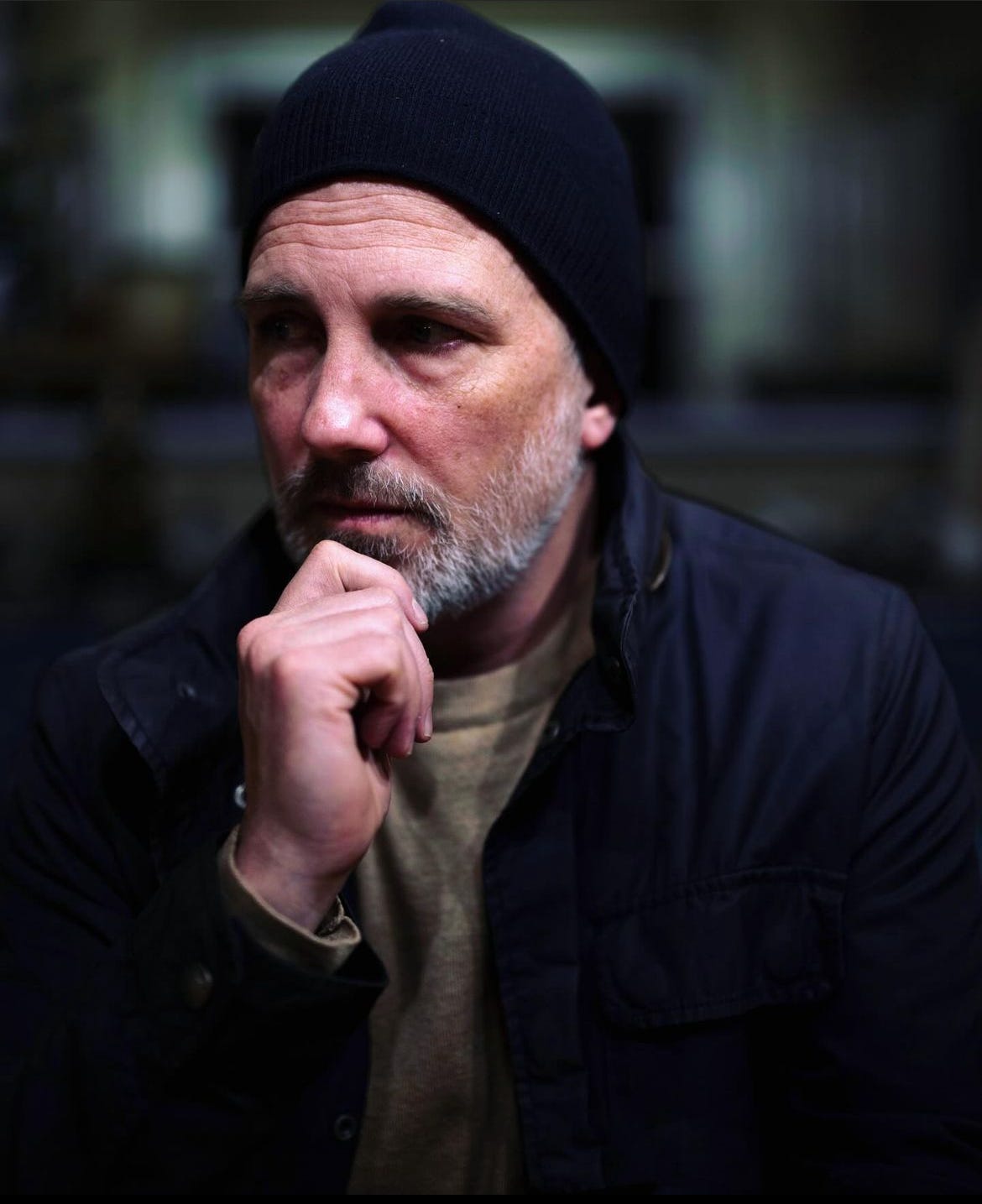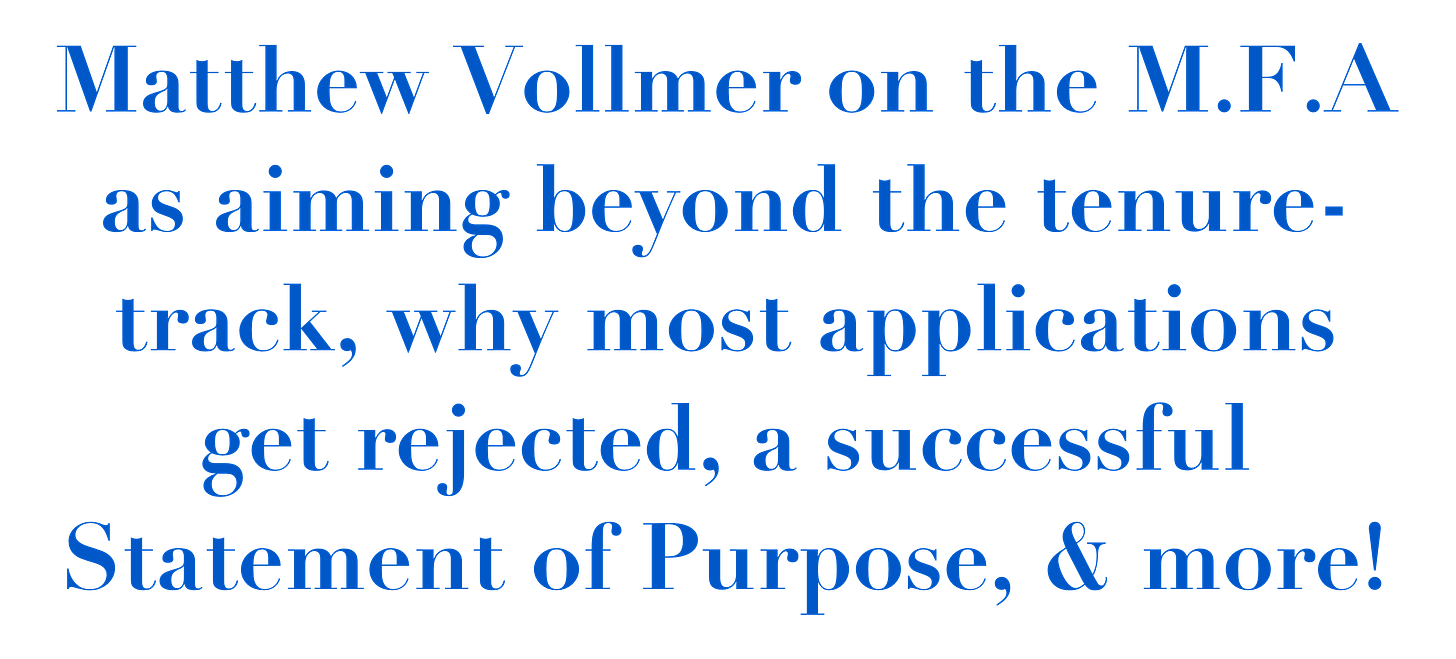Matthew Vollmer on the M.F.A as aiming beyond the tenure-track, why most applications get rejected, a successful Statement of Purpose, and more!
Faculty Spotlight with M.F.A. Program Director at Virginia Tech
Our first ever Faculty spotlight is with the amazing Matthew Vollmer, Virginia Tech M.F.A. Program Director and Creative Writing Professor for Fiction. He is also an accomplished writer himself.
Photograph by Jesse Brass
Matthew Vollmer is the author of two short-story collections—Future Missionaries of America and Gateway to Paradise—as well as three collections of essays—inscriptions for headstones, Permanent Exhibit, and This World Is Not Your Home: Essays, Stories, & Reports. He was the editor of A Book of Uncommon Prayer, which collects invocations from over 60 acclaimed and emerging authors, and served as co-editor of Fakes: An Anthology of Pseudo-Interviews, Faux-Lectures, Quasi-Letters, “Found” Texts, and Other Fraudulent Artifacts. His work has appeared in venues such as Paris Review, Glimmer Train, Ploughshares, Tin House, Oxford American, The Sun, The Pushcart Prize Anthology, and Best American Essays. A winner of an NEA and a graduate of the Iowa Writers’ Workshop, he directs the MFA program at Virginia Tech, where he is a Professor of English. His latest book, All of Us Together in the End, was published by Hub City Press in 2023, and received starred reviews in Publishers Weekly and Foreword Reviews.
Shannan:
How do you feel about the general health of the MFA today? Some people seem to contend that it is dying but that often feels a bit doomsday-ish. Still, I do wonder about the prognosis of a creative degree in a world that is consistently pushing technological automation over the much slower, much more nuanced process of actually creating — specifically, writing — a new work of art.
Matthew:
I understand—or think I understand—that this question has its origins in anxieties about how getting an MFA will translate into future survival for aspiring writers. But it’s important to remember, here at the outset of this discussion, that “the MFA” is not a monolith. Every MFA program is different. And every student matriculating through an MFA program will have a different experience of that program. Though every student at Virginia Tech will graduate with the same degree, they will leave with different stories about what they’ve accomplished, how they’ve benefitted or not from teaching, writing, and thinking about writing.
Furthermore, the MFA is somewhat unique in that it literally guarantees nothing to the student other than time and support to write. It doesn’t guarantee that you’re going to be successful. It doesn’t guarantee publication or employment. If networking and lifelong friendships and positive experiences and revelations about literature and the so-called “literary life” end up being fruits that you pluck along the way, that usually has more to do with a combination of timing, luck, and effort on the part of the student. The only thing I can guarantee
is that if you commit yourself to be determined, work hard, read voraciously, and keep an open mind, you will be transformed.
If you ask how I feel about the general health of Virginia Tech’s MFA, however, I would say that it’s thriving and is as healthy as it’s ever been. I can say with absolute certainty that ever since I’ve been here, and during the past three to five years, especially, I’ve continually had my mind blown by the work that MFA students have been submitting in my classes. I’ve spent countless hours during that time enjoying rich and surprising and lovely conversations about art, writing, life, publishing, and living on this earth as thinking, empathetic, and innovative human beings. And I know that my colleagues feel the same. I love the diversity of our program, the varied nature of the perspectives, as well as the opportunities students have to experiment in multiple genres and hybrid forms.
I pitched a Hail Mary to Iowa—the only place I applied in 2004, as I’d decided if I couldn’t attend the #1 MFA in the country, I didn’t want to go anywhere else.
Shannan:
You did your own MFA at the Iowa Writers’ Workshop — the O.G. MFA program in the world, right! I’d love to know a little bit more about your experience in applying to the program. And now that you actually evaluate MFA applications, do you have new insight into why your application might have stood out over others?
Matthew:
Before I talk about Iowa, let me provide some context: I attended N.C. State University a year after I completed my undergraduate degree in English at the University of North Carolina-Chapel Hill. I earned a Masters in English at N.C. State, with a concentration in creative writing, and applied to a number of programs—including Iowa—but didn’t get in anywhere. So I spent a year teaching at a small liberal arts school (now defunct) in central Massachusetts and used every free moment I had to work on stories.
I applied the next year to a handful of schools—including Iowa—but only earned one acceptance: the University of Pittsburgh. My wife-to-be also applied to graduate school, and because she was accepted to Purdue University for a Rhetoric and Composition PhD. (one of the top five in the nation, at the time, if memory serves correct), we figured that would be the more financially sound decision in the long run, since, at the time, Purdue’s placement of Rhet/Comp. grads was hovering around 100%.
So we moved to Lafayette, Indiana. I taught composition and speech the first year as a lecturer during our first year, and then, once I realized the high demand for business writing, enrolled in a practicum that promised to prepare me to teach such a class, which, for the next three years, I did. Four sections a semester. It was a godsend, actually. Because business writing involved strict adherence to conventions, it could be taught in a kind of formulaic manner, so I set up a website with assignment descriptions and really everything the students needed to perform their work. Every class period, I walked in, gave an overview of the day’s activities, then gave them time to work in class while I sat at the front of the class and worked on my own stories.
During this four year stretch at Purdue, I published my first story in New Letters. The Paris Review accepted my second story soon after—they were searching through their slush pile for a “New Writers” issue they planned for the next year and I was lucky enough to that they chose a story I’d sent in part because I’d received a positive note from the fiction editor a few months before.
In the next few years, I had a few more stories accepted—in places like PRISM International, Tin House, VQR, McSweeney’s Internet Tendency, Gulf Coast, and Fugue—and by the time Kelly finished her coursework, which meant that she could finish her doctorate and complete her degree in absentia, I pitched a Hail Mary to Iowa—the only place I applied in 2004, as I’d decided if I couldn’t attend the #1 MFA in the country, I didn’t want to go anywhere else.
(Looking back I think of myself as both lucky and naïve, and the idea that an MFA program could earn a ”number-one distinction” seems about as absurd and pointless as ranking fast food chains.) Long story short: I got in; I went. Iowa might have been the “O.G.” but I don’t think it was “the GOAT.”
I had some wonderful teachers—and some who were not so great—and I met weirdos and geniuses and losers and best friends, but at the time Iowa seemed to be chugging along on the fumes of its imagined greatness. I remember an administrator telling me that “getting in” basically guaranteed my degree and that I could spend my time there however I wanted.
Every workshop I ever took looked like every other workshop at every other institution I’d ever taken—everyone reads your story beforehand, then shows up on workshop day to discuss it while you shut up and take notes. Looking back on it, it’s staggering how un-creative this approach was.
One has to imagine that there are as many ways to “teach” creative writing as there are to deploy it. Why then did every teacher of creative writing decide to do it the same way?
Shannan:
I’d also love to hear about how you managed money as an MFA student and how you feel things might have changed now for students, especially post-pandemic?
Matthew:
I can’t think of a single MFA program that doesn’t require some kind of a financial sacrifice. Back when I enrolled as an MFA student at Iowa, they awarded me a $10,600 stipend—in return for teaching two “Gen Ed Lit” courses—and was subsequently charged $6k plus for tuition, which means that I was netting around 4 grand a year (!).
I took out the maximum amount in loans that I possibly could, and then spent the next 18 years repaying them (until I was able to apply for and win forgiveness). And I was one of the lucky ones—after I graduated, my partner was offered a job at Virginia Tech, along with a spousal hire, a position I eventually parlayed, after publishing a book and winning an NEA, into a tenure track position.
What I’m trying to say is that no matter what your financial situation, applying to an MFA program—and then accepting whatever offer you receive—involves enormous risk.
As I said before, the MFA doesn’t guarantee anything. Even so, it represents an incredible opportunity: three years—in VT’s case—to spend as much time as you possibly can devoted to making art, reading, and developing your craft. The idea that a student will wrap up their degree in three years, publish a book and find fame and fortune and a tenure track job immediately afterwards is probably just as improbable now as it was nearly twenty years ago when I first enrolled, if not more so.
Do some students end up achieving this goal? They do. Most don’t—but that’s okay, too, because every talented and driven student who’s graduated from our program has likely found a place in the world where they can do work that is creative, innovative, and meaningful.
Shannan:
At which point in a writer’s career would you encourage them to start thinking about an MFA? Are there any instances where you’d actually try and direct someone away from an MFA?
Matthew:
There’s no right answer to this. Apply when you feel ready. Will you likely have a stronger manuscript to submit five years from now, assuming you continue to work hard? Absolutely. But it’s like having a baby. Some couples have one right out of the gate—others wait twenty years. There are benefits to jumping the gun and benefits to waiting. The long and short of it usually is this: if you get in, you should probably go. I don’t know anyone who’s regretted getting an MFA. I also don’t know anyone who’s regretted having a baby.
Shannan:
I love that you pursue hybrid forms of writing and expression in your personal work. Now, most MFA programs are genre-based, so it can feel that there is some necessary demarcation required for writers. How would you expect another writer who mainly works in hybrid forms to navigate this situation, when applying but also if they’ve been accepted? Can MFA programs “break” beyond genre? Is that not, perhaps, the future of creative writing?
Matthew:
On the one hand, I love the idea of hybrid forms. There’s nothing I love to read more than a work that defies classification. On the other, as much as I like to create occasions for students to play and experiment, there’s very little demand from “the market” for such work.
Yes, there are all manner of literary magazines who will publish your lyric essays, collages, erasures, prose poems, etc. And there are small presses who will publish manuscripts of such. And, of course, it is good for the writer and for the writer’s brain to think beyond conventions and work to surprise oneself. But I also think it’s useful to imagine how you might write a “conventional” poem or novel.
Not that you shouldn’t kowtow to market demands. I guess more than anything I’m thinking about the fact that the reading public, at least in America, prefers to read novels. And while I’ve never discouraged a single MFA student from writing a novel, I don’t think that I’ve ever—until this past semester, when I turned Fiction Workshop into a Novel Workshop—planned an entire course around the writing of one.
Why? For one, I’d never seen it done. Secondly, as far as I knew, it’d never been offered here at Virginia Tech. Thirdly, the limited time-frame of “workshop model” tends to reward shorter, self-contained works that everyone can read and respond to in a week’s time and discuss within a 75-minute window. But wait. Imagine a class in which we didn’t workshop anything? (Or very little.) What would that look like? It turns out that such a class can be run and with gratifying results.
I care a lot about what that applicant has to say in their personal statement. I want to know first what can you make and then why is it important that you make it. I want to feel as soon as I begin reading that you’re telling me a story that matters.
Shannan:
Okay, quick and dirty: why do most applications get rejected?
Matthew:
Certainly not because they’re incompetent. Rarely do we receive—and I can only speak to the fiction side of the equation here—applications that aren’t competent. And I tend to care very little–maybe because, before Iowa, I lacked one myself—about so-called “pedigree.”
Letters or recommendation carry weight, but I care less about them and where you’ve published or where you’ve gone to school or what GPA you earned than what the applicant has submitted as a manuscript; secondly, I care a lot about what that applicant has to say in their personal statement. I want to know first what can you make and then why is it important that you make it. I want to feel as soon as I begin reading that you’re telling me a story that matters. I want you to convince me it’s alive, has blood, and is as strong and vulnerable as a living, breathing body.
Your writing needs to have rhythm. It needs to fool me into believing that you’re not just a writer—you’re a musician, a sorcerer, an artist.
Shannan:
We heard recently about Gettysburg Review’s shuttering. What are your thoughts on funding for the arts? For lit mags, specifically? Is it sustainable for lit mags to depend on institutions — whether governmental, educational, or charitable? Do you think there are other avenues that people don’t explore because it isn’t a well-trodden path? Or perhaps, does it feel sometimes that artists and writers like to have the “non-profit” image, and equate it with some kind of purity of craft?
Matthew:
It's incredible that any “lit mag” could have long term viability. Though I’ve served as a reader for several, I’ve never piloted one so I can’t speak with much integrity on the matter. I’m honestly surprised more rich folk aren’t embarking on benefactor-ships—or maybe they are? I mean, if I had piles of money, I would love to try to make some sort of arts slash literary magazine that would appeal to the masses and to niche audiences alike and whose proceeds could fund significant and necessary causes.
Then again, I don’t even deign to know who reads literary magazines or cares about them. I’m in awe of a place like Taco Bell Quarterly, to be honest. Who would have thought that a magazine with that title would be so popular? And yet, upon reflection, its success feels inevitable.
Shannan:
Pragmatic question, what are my chances of getting a tenured-track position as a professor with an MFA?
Matthew:
Incredibly low. Probably less than 0.01 percent. Let’s do some research and find out.
AWP said, in the improbably old year 2000:
“According to the Modern Language Association (MLA), job openings in English rose by 6% in 2000, from 899 positions in 1999 to 954 positions in 2000. Academics have reason to be "mildly optimistic" notes Gabriela Montell in "A Forecast of the Job Market in English" from The Chronicle of Higher Education (CHE). Positions for writers increased as well. The number of academic positions in AWP Job List increased by 26% from 280 total jobs in the 1999–2000 academic year to 354 total jobs in the 2000–2001 academic year. Many of these jobs, however, were temporary positions. Although the academic job market has improved, it remains a highly competitive arena with many caveats, which may undermine any job seeker’s optimism.”
I asked ChatGPT. It said that: “As of 2016, it's estimated that there are approximately 3,000 newly minted MFA graduates each year in the United States in the field of creative writing. However, the number of open tenure-track creative writing positions seems to be much lower. In 2015, there were 171 open positions, and this number decreased to 119 in 2016.”
I would have to assume the number has decreased from 2016. Let’s be generous and say that there are 100 positions in 2023. Keep the number of MFA students to 3000. That’s a 0.03 chance that anyone graduating in that particular year would get a position.
But remember, you’re not competing with only the number of people in a year who have graduated. You’re competing with the number of people who have graduated in the last 20 years—or at least the percentage of graduates who are looking for tenure track jobs. Even if that number is as low as 25%, that’s still “a lot.”
While I do believe in my heart that finding work as a professor of creative writing is one of the best jobs a writer can have, I also know that many other students have found careers in creative fields that are fulfilling. With the rise of social media, AI, and the need for thinking humans who know how to tell stories and deploy language in inventive ways, I can only imagine that the demand for creative writers will continue to rise.
Shannan:
Biggest advice for MFA hopefuls?
Matthew:
Write your ever-loving hearts out.
Shannan:
I’ve heard from students who’ve worked with you. You’re popular and they all speak highly of your teaching style. I think one of the reasons is that you genuinely take an interest in their work. Not just the content, but in them actually being able to work, to write. Do you think we forget that sometimes? That our job as writers is to…well…write? What gets in the way? How to clear the way?
Matthew:
I have this phrase I’ve been repeating ever since Douglas Kearney said it during his visit to Virginia Tech last year, when answering a young poet’s question regarding how poets might find their voices: “honor your interests.”
I honestly think there’s no better advice, aside from something I heard the writer Richard Bausch say years ago: “do a little bit of work every day.” Knowing what you love and need to write about, and committing yourself to the daily grind is a great place to start. That’s why I try my best to ground my teaching practices in steady work and enthusiasm. Let’s all work hard and celebrate that we’re doing so.
But let me back up for a second.
Too many years ago to count, the single most important creative writing course I ever took wasn’t a workshop. It wasn’t even a creative writing course. It was an independent study with an Associate Professor of Literature at N.C. State who’d generously agreed to manage an independent study with me. We planned to read Contemporary Literature. We started with Cormac McCarthy’s All the Pretty Horses. We moved on to Been Down so Long It’s Up to Me, by Richard Farina. We read Jesus’ Son by Denis Johnson.
At some point—during fall break—I went to New York City for the first time on my own and spent three days with one of my best friends. I wrote about the experience—as my professor had directed—and then upon returning read him the result. The professor—one who had a reputation for being hard to please—was delighted. He told me to turn it into a story for the next week’s meeting. I did and read it to him aloud. He told me I was on fire. He told me to write a new story for the following week. And so I did. And I continued to write a story a week for the next eight weeks. I never knew I could be so productive—perhaps because nobody had ever given me the opportunity.
I think that’s part of what I’m trying to recreate in my courses. I want to give students the opportunity—if only for a semester—to understand that they can be production machines.
I don’t see myself primarily as a writer. I see myself primarily as a teacher. And honestly not even that. I don’t have much to teach as it turns out. I can’t tell you how to be yourself any more than anyone else. But I can create opportunities for you to find yourself and to honor your interests and to discover what moves you and how to follow those impulses. My only investment is that you identify the stories you want and need to tell—in only the ways that you can—and that you work steadily to achieve your goals.
Shannan:
We asked VT Alum Yasmine Ameli this and I think it’d be super cool to get an MFA program director’s take on it also: Design your ideal creative writing program. Imagine you have all the resources and support in the world. What will this look like?
Matthew:
First of all: hire an all-star team. You need a coach, but you also need assistant coaches, ones who are aspiring to be coaches themselves. So I’d think about the previous MFA students I’ve had who I know would be innovative teachers—and hire them.
Have MFA students teach only creative writing, but broaden the audience so that in addition to university graduates it includes:
High school students
Middle school students
Elementary school students
Online students
Local Communities
Prisoners
Various religious communities
Offer tracks in fiction, poetry, creative writing, playwriting, screenwriting, hybrid forms, YA, genre fiction, and video game production.
Do a semester abroad.
Fund whatever research a student requires. Need to travel to Antarctica? Need to spend a summer at Joshua Tree? Hiroshima? Bangladesh? Scotland? We got you.
Have a dedicated building for MFA students that offers spacious housing, a library, performance space, gymnasium, basketball and tennis and racquetball courts, pool, cafeteria, coffee shop, theatre for film screenings, community garden, busses/vans for transportation purposes (field trips to D.C., say, or Charlottesville, or wherever), a lab/computer space for video game/AI work, a studio where writers can work on and design our award-winning literary magazine, and classrooms with huge windows overlooking the VT campus. LET’S GO!
Applications for Virginia Tech’s M.F.A program close on January 15. Read our full deep-dive here.




















